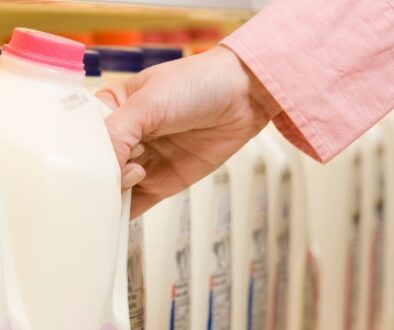U.S. Government Addresses Infant Formula Shortage
President Biden invoked the Defense Production Act to ensure that U.S. manufacturers have the necessary ingredients to make safe, healthy infant formula. The president is requiring suppliers to direct needed resources to infant formula manufacturers before any other customer who may have ordered that good because of the formula shortage. Directing firms to prioritize and allocate the production of key infant formula inputs will help increase production and speed up supply chains, the White House said.
Additionally, the White House is launching “Operation Fly Formula” to speed up the import of infant formula and get more formula to stores as soon as possible. Biden has directed the Department of Health and Human Services (HHS) and USDA to use Department of Defense (DOD) commercial aircraft to pick up overseas infant formula that meets U.S. health and safety standards so it can get to store shelves faster. DOD will use its contracts with commercial air cargo lines, as it did to move materials during the early months of the COVID pandemic, to transport products from manufacturing facilities abroad that have met FDA safety standards. The White House notes bypassing regular air freighting routes will speed up the importation and distribution of formula and serve as immediate support as manufacturers continue to ramp up production.
FDA earlier this week announced a guidance document for the industry to help increase the supply of infant formula. FDA intends to temporarily exercise enforcement discretion with respect to certain requirements for infant formulas that may not comply with certain statutory and regulatory requirements and is seeking information from manufacturers regarding the safety and nutritional adequacy of their products.
The guidance document is intended to explain factors that FDA intends to consider in making case-by-case determinations about whether to exercise enforcement discretion to allow the introduction into interstate commerce, including importation, of infant formula that is safe and nutritionally adequate but may not comply with all statutory and regulatory requirements. The guidance also is intended to advise infant formula manufacturers about the type of information to provide to FDA if they would like the agency to consider whether to exercise enforcement discretion with regard to particular products.
The guidance, which is being implemented immediately, will remain in effect until Nov. 14, 2022, and FDA will evaluate whether any extension is necessary.
Also, FDA and Abbott agreed on next steps to reopen Abbott’s facility in Sturgis, Michigan, which was closed due to concerns about bacterial contamination after four infants fell ill.
The U.S. Justice Department filed a complaint and the proposed consent decree Monday. The complaint alleged that Abbott manufactured powdered infant formula under conditions and using practices that failed to comply with regulations designed to ensure the quality and safety of infant formula, including protection against the risk of contamination from bacteria such as Cronobacter sakazakii, which had been found in the facility.
Abbott has agreed to resolve the complaint in its proposed consent decree of permanent injunction. Under the consent decree, Abbott must retain outside expert assistance to bring its facility into compliance with the Federal Food, Drug and Cosmetic Act and good manufacturing practice regulations.
“Our No. 1 priority is getting infants and families the high-quality formulas they need, and this is a major step toward re-opening our Sturgis facility so we can ease the nationwide formula shortage. We look forward to working with the FDA to quickly and safely re-open the facility,” says Robert B. Ford, chairman and CEO, Abbott. “We know millions of parents and caregivers depend on us, and we’re deeply sorry that our voluntary recall worsened the nationwide formula shortage.”
Abbott also notes that after a thorough investigation by FDA, the Centers for Disease Control and Prevention and the company itself, and review of all available data, there was no conclusive evidence to link Abbott’s formulas to reported infant illnesses.
Since the recall, Abbott adds that it has taken numerous measures to mitigate the supply shortage, such as focusing on production in its Cootehill, Ireland, facility, air shipping millions of cans of infant formula powder from this plant into the United States. It also has worked with USDA and WIC agencies, paying rebates on competitive products in states where Abbott holds the WIC contract, when Similac is not available. Additionally, Abbott says it has prioritized infant formula production at its Columbus, Ohio, facility and ramped up production at its other U.S. manufacturing site in Casa Grande, Arizona, running its facilities at full capacity to help replenish the supply.
Abbott says once FDA confirms the initial requirements for start-up have been met, it could restart its Sturgis site within two weeks. The company would begin production of EleCare, Alimentum and metabolic formulas first and then begin production of Similac and other formulas. From the time Abbott restarts the site, it will take six to eight weeks before product is available on shelves, the company adds.
U.S. Attorney General Merrick B. Garland says the actions detailed in the consent decree will help to safely increase the supply of baby formula for families.
“The Justice Department will vigorously enforce the laws ensuring the safety of our food and other essential consumer products, and we will work alongside our partners across government to help make sure those products are available to the American people.”
The Justice Department also says this proposed consent decree is part of its broader work to address the current infant formula shortage. As part of these efforts, U.S. Associate Attorney General Vanita Gupta this week sent a letter to state attorneys general urging them to use their state-law authorities to ensure that vulnerable families are not taken advantage of during this time and encouraging them to contact the department with any evidence of collusive price fixing, bid rigging or market allocation.
Around the world, other manufacturers have stepped in to help contribute to the U.S. supply. Nestlé confirmed this week that it has brought in Gerber Good Start Extensive HA from the Netherlands and Alfamino from Switzerland for Nestlé Health Science.
“We prioritized these products because they serve a critical medical purpose as they are for babies with cow’s milk protein allergies,” a Nestlé spokesperson says in a statement provided to Cheese Market News. “Of note, both products were already being imported, so we were able to act quickly. We moved shipments up and rushed via air to help fill immediate needs.”
Additionally, given FDA’s announcement that aims to give companies temporary flexibility with regard to the import of certain infant formulas, Nestlé says it is reviewing the guidance and assessing where it may be able to tap into the Nestlé global nutrition network to help.
Keep Up To Date On Cheese Industry News
Find all of HART Design & Manufacturing current industry news here.
Source: CMN




